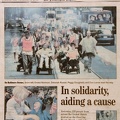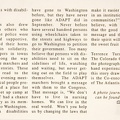On September 17, 2003, an estimated 10,000 ADAPT members met in Washington D.C. to advocate for the passage of the landmark legislation, Mi Cassa. ADAPT members from across the nation gathered again to make the case for freeing persons with dis-abilities from institutions. Senators Harkin and Specter once again spoke to the group, pledging their support for the legislation. After the rally, members of ADAPT spread out to visit members of Congress and deliver their message of freedom. The activities were familiar. This is not the first time that ADAPT has been in Washington, but this year was different.
Seeking a way to dramatize its message of independence and freedom, ADAPT members met in Philadelphia on September 3, 2003 and marched to Washington. One hundred twenty-five persons began the march. But by the time the marchers reached Washington their ranks had swollen to nearly 500. The march took over a year to plan. Terrence Turner, co-Executive Director of Atlantis, said, "We were like an army. Everything had to be planned in advance. Plans for food, sleeping arrangements, and police escorts needed to be executed. Our planning committee did an inspiring job."
The marchers traveled using wheelchairs. They stayed to the streets and highways. Police escorts traveled with them, changing as the group passed from one political jurisdiction to another. Vans, trucks, and trailers accompanied the marchers to carry equipment. Two vehicles carried portable toilets. The group covered from ten to sixteen miles a day. Each day a camp committee went ahead to pitch tents and pre-pare for the night. The marchers slept outdoors all but three nights. Much of the food was provided along the way by well-wishers. Most of these well-wishers were church groups.
Weather proved a challenge for the marchers. The group was met the first day with pouring rain. It rained a number of other days as well, but Mr. Turner said that even more uncomfortable were the days when the marchers put on rain gear, anticipating rain, and it did not rain. "The rain gear was like wear-ing sweat suits," he said. One night the group slept in an ice skating rink. While the ice had been removed, the building was damp and cold. An indoor fog blanketed the sleepers causing them to have a very unpleasant night.
At one point the group traveled along an interstate high-way. Cars whizzed by at 60 miles an hour. The marchers were forced to travel in single file. Over one hundred wheelchairs formed a line across the Maryland country-side. ADAPT signaled for all to see that persons) with disabilities belong anywhere and can live independently.
The marchers traveled through the rolling hills of Maryland. Terrence was one of only two persons who continuously used a manual wheelchair. "You would think that you had reached the top of a hill and discover that you had just reached a little plateau, he said. "A ten mile day in this terrain is a very long day when you're pushing your wheelchair every inch of the way." But he and the others pushed on. Only two persons were forced to leave the march. One person had a stroke and could not return but a second marcher who left the group for health reasons was able to rejoin the march before the group reached Washington.
"In spite of the rain and the heat, the hills and the traffic, the uncomfortable sleeping conditions, and the physical challenges, we met each day with a surge of energy that we drew from one another and from our purpose for being there," said Terrence. Each night the marchers sat around their campsite and talked. They got to know one another and drew strength from one anothers commitment to improve the lives of persons with disabilities.
The marchers also drew strength from others who they met. The police were courteous and supportive. Drivers honked their horns and waved in solidarity. Local newspapers in towns and cities along the way interviewed the marchers and wrote positive stories. These stories were read to the group in their evening meetings. Other local people provided food and a place for the group o set up camp at night. ADAPT had a chance to tell its story as its members marched to Washington. Persons with disabilities have gone to Washington before, but they have never gone like ADAPT did in September. Never before have several hundred persons using wheelchairs taken to the streets and highways to go to Washington to petition their government. Too many believe that persons with disabilities need to sit on the sidelines of life, watching and waiting, but never getting out on the field to play themselves. The ADAPT marchers brought a message with them to the Congress. That message is, "We don't have to live in nursing homes. We can live in the real world. Won't you help us by changing the laws that make it easier for us to live in an institution than in our communities?" We hope and believe, with the marchers, that the good sense of their message and the strength of their spirit will bring to bare the sweet fruit of freedom.
Terrence Turner provided The Colorado Quarterly with the photograms and the first hand experience upon which this story draws. Mr. Turner is the Co-executive Director of The Atlantis Community.
A photo journal of the trip can be found on page 23
- Created on
- Tuesday 23 July 2013
- Posted on
- Friday 27 November 2020
- Visits
- 271
- Rating score
- no rate
- Rate this photo


0 comments